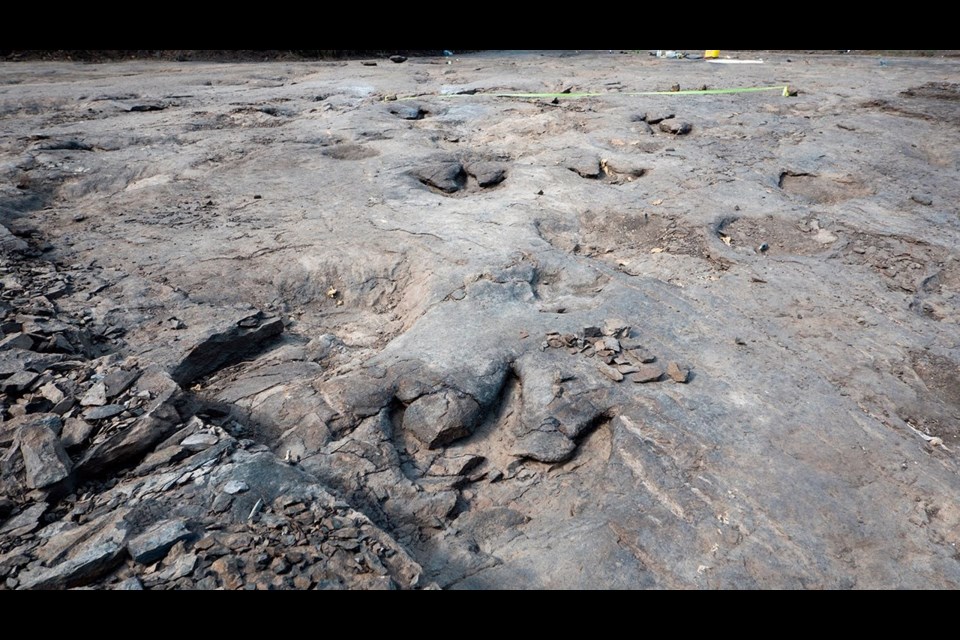An Alberta man has been sentenced to jail and fined $15,000 for excavating slabs of protected dinosaur fossil footprints near Hudson’s Hope in 2020.
Bennward Ingram and three other men were caught in the act using power and heavy-duty hand tools at the Six Peaks track site in July 2020.
Ingram, 39, of Pincher Creek, pleaded guilty in the matter and was sentenced in provincial court earlier this month to 25 days jail, along with the fine and a $2250 victim surcharge.
One of his accomplices, Austin McNolty, was sentenced to 30 days jail and fined $20,000 for his role in the crime in October 2021.
"Sites like the [Six Peaks Dinosaur Track Site] are often in remote locations that are not easily monitored and rely on courts like this to impose sentences that will give pause to others who may seek to engage in the same behaviour,” Judge Darin Reeves said during Ingram’s sentencing on Jan. 10.
First discovered in 2008, Six Peaks is home to more than 500 dinosaur footprints in 56 distinct trackways from animals that walked through the area 113 to 125 million years ago, according to Reeves’ ruling.
The site was given protected status under the provincial land act in 2016 and is "one of the 10 most important track sites in North America," Reeves said.
“Tracks themselves occupy an unusual category of palaeontological resource, as, unlike skeletal fossils commonly seen in museums, dinosaur tracks exist on surfaces that themselves represent portions of the ancient landscape that have become part of the current physical and cultural landscape via natural erosion or excavation,” he said.
“Trackways also evidence how the dinosaur lived, moved, its gait and behaviour. Damaging and removing an individual footprint not only destroys that footprint for its scientific value, it also disturbs the integrity of the remaining tracks and landscape and the series of tracks of which it was part.”
According to the ruling, Ingram and the three other men, two of which were not identified, were witnessed excavating the fossils in six areas “over a period of at least two-and-a-half hours” using various tools including an air chisel, sledgehammers, and pry bars.
“Large slabs of fossil tracks were either removed, or were damaged by being broken up, and were possibly destroyed,” Reeves said. “The excavation work was halted only when two separate groups of witnesses arrived and began observing the work, at which point the four men packed up their equipment and departed.”
“No fossil tracks removed from the site have ever been recovered.”
Along with their scientific significance, the tracks were of cultural value to local First Nations. Reeves noted the Six Peaks site is to be included in the Klin-se-za Provincial Park, and that the Saulteau First Nations were planning to include eco-tours of the fossil site through its nearby Carbon Lake Lodge.
Reeves said the vandalism has had economic impacts and affected educational opportunities, and that First Nation “community members are now fearful that additional acts of vandalism may occur in these otherwise remote and culturally important areas.”
The tracks are now more easily susceptible to further degradation, damaging future scientific research “potentially with longer and more far-reaching consequences,” Reeves said.
“Cracks or fractures have been created that will now more rapidly accelerate otherwise natural erosion and as a result, a significant degree of scientific information has been lost and will continue to be lost as the damage now naturally propagates,” Reeves said.
Ingram works as an excavator operator and has no prior record, according to the ruling.
Crown prosecutors were seeking a 30 to 35-day jail term along with the fine, while Ingram’s defence sought a suspended sentence involving one year of probation, 120 hours of community service, and a $10,000 fine.
“Mr. Ingram frankly admitted to the court he had no excuse for his actions, that he did not appreciate the importance of the site to the First Nations or science, and expressed deep remorse for his actions and the damage he created,” Reeves said.


